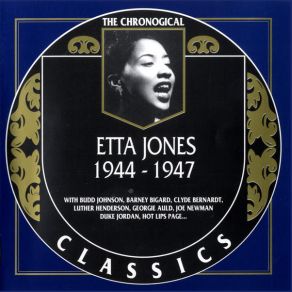1944-1947
Download links and information about 1944-1947 by Etta Jones. This album was released in 1999 and it belongs to Jazz, Vocal Jazz genres. It contains 21 tracks with total duration of 58:57 minutes.

|
|
|---|---|
| Artist: | Etta Jones |
| Release date: | 1999 |
| Genre: | Jazz, Vocal Jazz |
| Tracks: | 21 |
| Duration: | 58:57 |
| Buy it NOW at: | |
| Buy on iTunes $7.99 | |
| Buy on Amazon $7.99 | |
Tracks
[Edit]| No. | Title | Length |
|---|---|---|
| 1. | Salty Papa Blues | 2:57 |
| 2. | Evil Gal Blues | 2:59 |
| 3. | Blow Top Blues | 2:36 |
| 4. | Long, Long Journey | 2:51 |
| 5. | You Ain't Nothin' Daddy | 2:46 |
| 6. | So Tired | 2:50 |
| 7. | Solitude | 2:51 |
| 8. | I May Be Wonderful | 2:47 |
| 9. | Man Wanted | 2:42 |
| 10. | Blues to End All Blues | 2:59 |
| 11. | Along My Souvenirs | 2:38 |
| 12. | Mean to Me | 2:43 |
| 13. | Osculate Me, Daddy | 2:30 |
| 14. | My Sleepy Head | 2:47 |
| 15. | I Sold My Heart to the Junkman | 2:48 |
| 16. | The Richest Guy In the Graveyard | 3:01 |
| 17. | Ain't No Hurry Baby | 2:36 |
| 18. | What Ev'ry Woman Knows | 3:18 |
| 19. | Overwork Blues | 2:58 |
| 20. | Misery Is a Thing Called Moe | 2:52 |
| 21. | This Is a Fine Time | 2:28 |
Details
[Edit]Etta Jones was a strikingly beautiful, authentically soulful woman who sang both blues and jazz for more than half a century without ever receiving the kind of praise and acclaim she so richly deserved. These are her very earliest recordings. First come four variations on the blues composed by producer Leonard Feather, backed by the Barney Bigard band with trumpeter Joe Thomas, tenor saxophonist Georgie Auld, and a rhythm section of Feather, Billy Taylor, Chuck Wayne, and Stan Levey. These opening tracks, recorded for the Black & White label on December 29, 1944, are reminiscent of Dinah Washington's 1943 recording debut with Lionel Hampton. While Washington was a knockout from the first note, 16-year-old Etta Jones just sang from her heart as if it were as natural as breathing air. The brassy and sassy "You Ain't Nothin' Daddy" was recorded sometime near the beginning of 1945 for the Chicago label. Backing her on this occasion was a sextet led by that elusive but legendary alto saxophonist Floyd "Horsecollar" Williams, with trumpeter Jesse Drakes and a rhythm section of Duke Jordan, Gene Ramey, and J.C. Heard. Another Black & White session dating from sometime in 1945 found the singer performing alongside sympathetic tenor saxophonist Budd Johnson and the Cyril Haynes Quartet. Pianist Haynes sounded a bit like Eddie Heywood, Jr. On January 2, 1946, Etta Jones made two sides for the National label with Pete Johnson's All Stars, a formidable jam machine fortified with trumpeter Hot Lips Page, trombonist Clyde Bernhardt, and saxophonists Budd Johnson and Don Stovall. By this time the singer had really found herself and was capable of dishing it out with plenty of mustard. On June 11, 1946, Budd Johnson participated in the vocalist's first Victor recording date, with excellent backing by J.C. Heard & His Orchestra. Etta Jones and Budd Johnson's version of "Among My Souvenirs" stands among the greatest interpretations this song has ever lived through. Nine months later (to the day), Heard's orchestra backed Jones on four more Victor recordings, this time with the band featuring trumpeter Joe Newman and tenor saxophone legend George "Big Nick" Nicholas. There's even a lullaby with a delicate celeste intro by Jimmy Jones. What a pleasure to hear this gifted vocalist backed by musicians of such high caliber. This collection of rare and precious recordings closes with four tracks waxed for the Victor label on October 8, 1947. Present on this session — an auspicious occasion as it brought listeners the first known recording of Leonard Feather's "Misery Is a Thing Called Moe" — was once again the highly skilled and very dependable tenor saxophonist Budd Johnson.